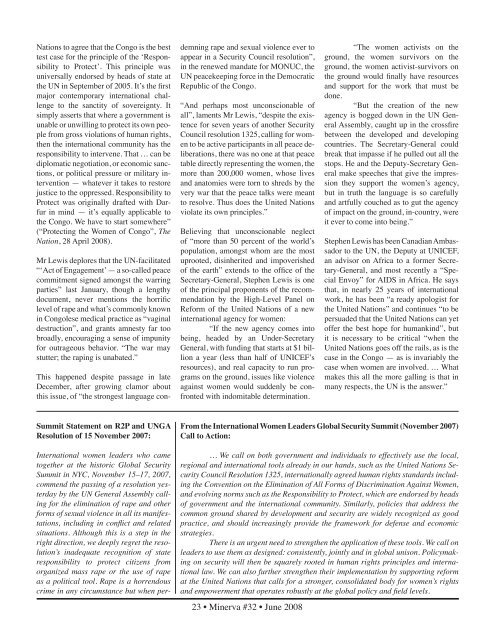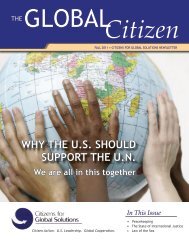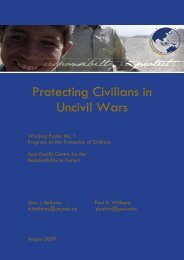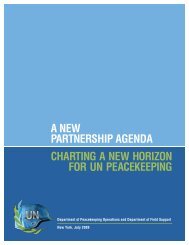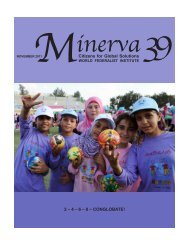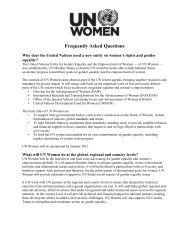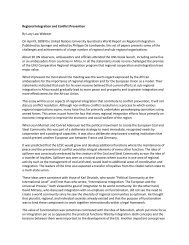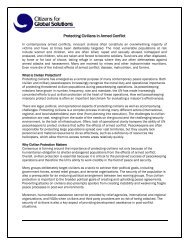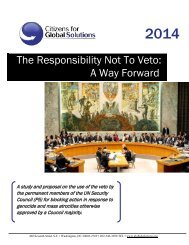Minerva, Spring 2008 (Volume 32) - Citizens for Global Solutions
Minerva, Spring 2008 (Volume 32) - Citizens for Global Solutions
Minerva, Spring 2008 (Volume 32) - Citizens for Global Solutions
You also want an ePaper? Increase the reach of your titles
YUMPU automatically turns print PDFs into web optimized ePapers that Google loves.
Nations to agree that the Congo is the best<br />
test case <strong>for</strong> the principle of the ‘Responsibility<br />
to Protect’. This principle was<br />
universally endorsed by heads of state at<br />
the UN in September of 2005. It’s the first<br />
major contemporary international challenge<br />
to the sanctity of sovereignty. It<br />
simply asserts that where a government is<br />
unable or unwilling to protect its own people<br />
from gross violations of human rights,<br />
then the international community has the<br />
responsibility to intervene. That … can be<br />
diplomatic negotiation, or economic sanctions,<br />
or political pressure or military intervention<br />
— whatever it takes to restore<br />
justice to the oppressed. Responsibility to<br />
Protect was originally drafted with Darfur<br />
in mind — it’s equally applicable to<br />
the Congo. We have to start somewhere”<br />
(“Protecting the Women of Congo”, The<br />
Nation, 28 April <strong>2008</strong>).<br />
Mr Lewis deplores that the UN-facilitated<br />
“‘Act of Engagement’ — a so-called peace<br />
commitment signed amongst the warring<br />
parties” last January, though a lengthy<br />
document, never mentions the horrific<br />
level of rape and what’s commonly known<br />
in Congolese medical practice as “vaginal<br />
destruction”, and grants amnesty far too<br />
broadly, encouraging a sense of impunity<br />
<strong>for</strong> outrageous behavior. “The war may<br />
stutter; the raping is unabated.”<br />
This happened despite passage in late<br />
December, after growing clamor about<br />
this issue, of “the strongest language condemning<br />
rape and sexual violence ever to<br />
appear in a Security Council resolution”,<br />
in the renewed mandate <strong>for</strong> MONUC, the<br />
UN peacekeeping <strong>for</strong>ce in the Democratic<br />
Republic of the Congo.<br />
“And perhaps most unconscionable of<br />
all”, laments Mr Lewis, “despite the existence<br />
<strong>for</strong> seven years of another Security<br />
Council resolution 1<strong>32</strong>5, calling <strong>for</strong> women<br />
to be active participants in all peace deliberations,<br />
there was no one at that peace<br />
table directly representing the women, the<br />
more than 200,000 women, whose lives<br />
and anatomies were torn to shreds by the<br />
very war that the peace talks were meant<br />
to resolve. Thus does the United Nations<br />
violate its own principles.”<br />
Believing that unconscionable neglect<br />
of “more than 50 percent of the world’s<br />
population, amongst whom are the most<br />
uprooted, disinherited and impoverished<br />
of the earth” extends to the office of the<br />
Secretary-General, Stephen Lewis is one<br />
of the principal proponents of the recommendation<br />
by the High-Level Panel on<br />
Re<strong>for</strong>m of the United Nations of a new<br />
international agency <strong>for</strong> women:<br />
“If the new agency comes into<br />
being, headed by an Under-Secretary<br />
General, with funding that starts at $1 billion<br />
a year (less than half of UNICEF’s<br />
resources), and real capacity to run programs<br />
on the ground, issues like violence<br />
against women would suddenly be confronted<br />
with indomitable determination.<br />
“The women activists on the<br />
ground, the women survivors on the<br />
ground, the women activist-survivors on<br />
the ground would finally have resources<br />
and support <strong>for</strong> the work that must be<br />
done.<br />
“But the creation of the new<br />
agency is bogged down in the UN General<br />
Assembly, caught up in the crossfire<br />
between the developed and developing<br />
countries. The Secretary-General could<br />
break that impasse if he pulled out all the<br />
stops. He and the Deputy-Secretary General<br />
make speeches that give the impression<br />
they support the women’s agency,<br />
but in truth the language is so carefully<br />
and artfully couched as to gut the agency<br />
of impact on the ground, in-country, were<br />
it ever to come into being.”<br />
Stephen Lewis has been Canadian Ambassador<br />
to the UN, the Deputy at UNICEF,<br />
an advisor on Africa to a <strong>for</strong>mer Secretary-General,<br />
and most recently a “Special<br />
Envoy” <strong>for</strong> AIDS in Africa. He says<br />
that, in nearly 25 years of international<br />
work, he has been “a ready apologist <strong>for</strong><br />
the United Nations” and continues “to be<br />
persuaded that the United Nations can yet<br />
offer the best hope <strong>for</strong> humankind”, but<br />
it is necessary to be critical “when the<br />
United Nations goes off the rails, as is the<br />
case in the Congo — as is invariably the<br />
case when women are involved. … What<br />
makes this all the more galling is that in<br />
many respects, the UN is the answer.”<br />
Summit Statement on R2P and UNGA<br />
Resolution of 15 November 2007:<br />
International women leaders who came<br />
together at the historic <strong>Global</strong> Security<br />
Summit in NYC, November 15–17, 2007,<br />
commend the passing of a resolution yesterday<br />
by the UN General Assembly calling<br />
<strong>for</strong> the elimination of rape and other<br />
<strong>for</strong>ms of sexual violence in all its manifestations,<br />
including in conflict and related<br />
situations. Although this is a step in the<br />
right direction, we deeply regret the resolution’s<br />
inadequate recognition of state<br />
responsibility to protect citizens from<br />
organized mass rape or the use of rape<br />
as a political tool. Rape is a horrendous<br />
crime in any circumstance but when per-<br />
From the International Women Leaders <strong>Global</strong> Security Summit (November 2007)<br />
Call to Action:<br />
… We call on both government and individuals to effectively use the local,<br />
regional and international tools already in our hands, such as the United Nations Security<br />
Council Resolution 1<strong>32</strong>5, internationally agreed human rights standards including<br />
the Convention on the Elimination of All Forms of Discrimination Against Women,<br />
and evolving norms such as the Responsibility to Protect, which are endorsed by heads<br />
of government and the international community. Similarly, policies that address the<br />
common ground shared by development and security are widely recognized as good<br />
practice, and should increasingly provide the framework <strong>for</strong> defense and economic<br />
strategies.<br />
There is an urgent need to strengthen the application of these tools. We call on<br />
leaders to use them as designed: consistently, jointly and in global unison. Policymaking<br />
on security will then be squarely rooted in human rights principles and international<br />
law. We can also further strengthen their implementation by supporting re<strong>for</strong>m<br />
at the United Nations that calls <strong>for</strong> a stronger, consolidated body <strong>for</strong> women’s rights<br />
and empowerment that operates robustly at the global policy and field levels.<br />
23 • <strong>Minerva</strong> #<strong>32</strong> • June <strong>2008</strong>


